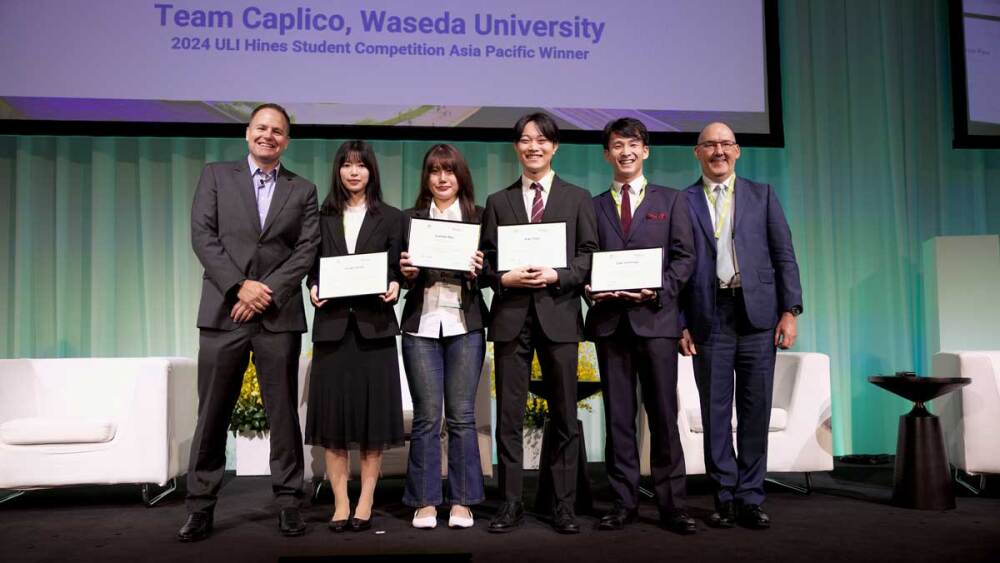The winners of the second ULI Hines Student Competition for the Asia Pacific region faced a dual challenge: create a compelling urban development proposal and follow in the footsteps of classmates who won the inaugural contest.
Team Caplico’s victory this year marks the second win for Japan’s Waseda University since the competition expanded to Asia Pacific in 2023.
Over three weeks, 27 teams from across the region devised a comprehensive development proposal to transform Tokyo’s former Tsukiji Fish Market into a thriving, mixed-use, transit-oriented neighborhood. A jury of six regional and local industry leaders selected five finalist teams and ultimately awarded first prize to Team Caplico—a decision announced at the ULI Asia Pacific Summit in Tokyo.
The team consisted of three graduate students pursuing master of architecture degrees—Yuki Tominaga, Yungju Hsieh, and team leader Koki Yano—and Yunwoo Ryu, an undergraduate pursuing a bachelor of international liberal studies degree with a major in sociology.
Their winning proposal, titled The BioChem Frontier, reimagines the site as an innovation hub and well-connected tourist destination. The plan would elevate Japan as a dynamic ecosystem for biochemistry start-ups while tackling the challenges of an aging population through research initiatives. In conceptualizing The BioChem Frontier, Team Caplico took inspiration from the Kashiwanoha Smart City project in Japan, the pedestrian-friendly streets of Europe, and the thriving start-up ecosystem of San Francisco.
”We’re thankful for the opportunity to put our theoretical knowledge to the test with a real-world site, which helped us gain a deeper understanding ... of urban design and redevelopment,” the team said.
Throughout the hands-on exercise, the team discovered the significance of each step in the development process.
“I was able to learn that every zoning, spacing, and design needs [its] own reason and evidence, while trying to find the best option in the given space,” said Yunwoo Ryu.
The team members at times found themselves at odds over how the site should function, such as whether to make it car-free. But according to Yungju Hsieh, they always let the overall vision guide their decisions.
“I think the most difficult challenge is to realize the concept of vision in spatial design,” she said. “In the end, we ... thought about how to design it in a way that would best fit the vision’s goals.”
Leaders of both Hines and ULI say the experience gained and lessons learned will serve participants—and the industry—well.
“This competition offers a promising glimpse into our next generation of real estate leaders, and highlights the importance of fostering creativity and collaboration in the pursuit of sustainable urban development, which is a key priority for ULI,” said Alan Beebe, ULI Asia Pacific chief executive officer.
“Young people are demanding more sustainable futures,” added Ray Lawler, Hines chief executive officer for Asia Pacific, who served on the jury. “This competition provides an ideal platform to inspire them to make that happen. We’re privileged to be a part of this and to be equally inspired by the brightest young minds—the next generation of real estate leaders—to address key issues and build more sustainable communities together.”
With two consecutive victories notched by Waseda University teams, future competitors from the school will have a strong legacy to uphold—as well as role models to emulate.
“I am certain that, next year, our successors from our lab will also participate,” Yuki Tominaga said. “I hereby apologize for the pressure we are putting on them. Good luck!”





